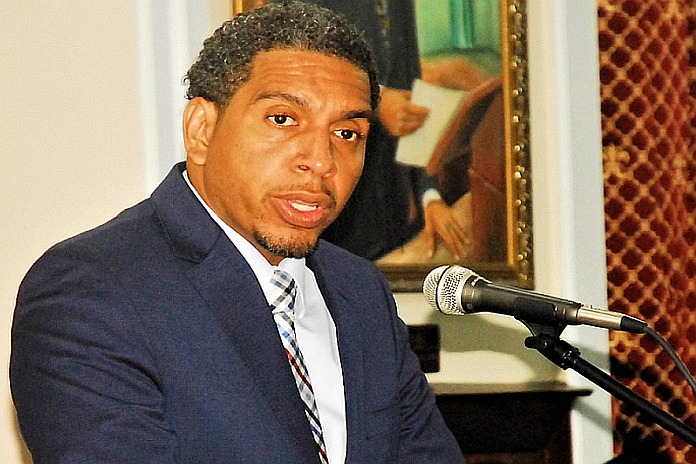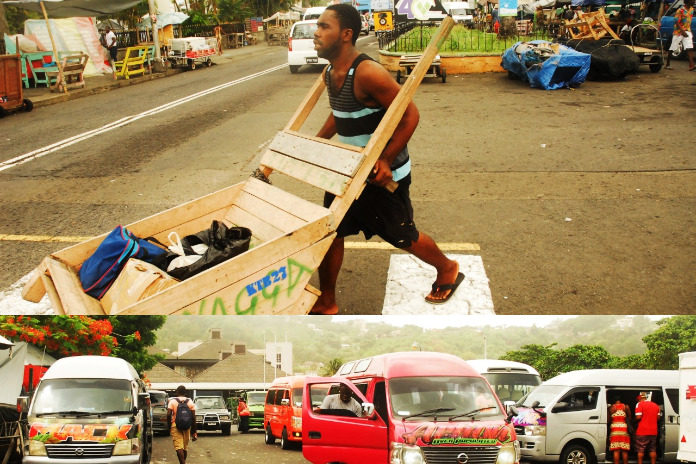By Caribbean News Global contributor
KINGSTOWN, St Vincent — St Vincent and the Grenadines minister of finance, Camillo Gonsalves, during the presentation of a ministerial statement recently pertaining to the government’s stimulus package and supplementary budget, outlined several areas of success.
“As of June 12, 2020, the government has paid Displacement Supplementary Income to 1,496 Vincentians. These 1,496 Vincentians were affected by the closures in the hospitality sector. To date, the monthly $300 payment to these 1,496 Vincentians has cost the government $1.02 million,” finance minister Gonsalves added, “1,100 Vincentians received a similar $300 per month via the Unemployment Benefit offered by the National Insurance Services.
“This programme has paid just over $600,000.00 to date. These 2,596 Vincentians represent 82 percent of the 3,164 claims that have been filed to date. Many of the unpaid claims are awaiting additional supporting documentation, while some have been rejected on various grounds. The data indicate that 60 percent of the beneficiaries of these programmes are women and that 66 percent are under the age of 44. On average, these programmes replaced approximately 30 percent of the beneficiaries’ pre-pandemic wages.”
COVID-19 relief
Finance minister Gonsalves illustrated the following:
- Workers in the informal sector, particularly vendors in towns and those who traditionally dependent on trade adjacent to schools, are eligible for Interim Assistance Benefits of $300 per month for three months. A special window was created to make a one-off payment of $300 to handcart operators. In total, 1,644 informal sector workers – inclusive of 105 handcart operators – have received Interim Assistance Benefits. To date, these benefits have cost approximately $460,000.
- A further 60 vendors who traditionally plied their trade along the sea wall were given a compensation package of $4,500 each to remove their structures and vacate the sea wall area as a prelude to the construction of the modern port and cargo terminal. The compensation, totaling $275,000 makes provision for three months income support of $715 per month, in addition to amounts for the value of their structure, removal allowance and timely removal bonus.
- This compensation, previously agreed by the Cabinet, was timed to maximise its benefit to those vendors affected by the pandemic-related slowdown in activity.
- Vulnerable Vincentians –particularly the elderly the disabled, or those experiencing increased financial vulnerability as a result of the pandemic – received another type of Interim Assistance Benefit. This benefit is a monthly payment of $200 for the remainder of the year. Six hundred Vincentians are currently receiving this benefit. To date, approximately $260,000 has been spent on this programme.
- A total of 451 minibus operators have registered to receive two months of income support of $500 or $600 for 18-seater and 25-seat or larger buses, respectively. The government paid approximately $180,000 to 351 operators. A further payment to the larger 451-operator cohort is expected shortly.
- Additionally, through negotiations with the minibus operators, the Government agreed to accelerate the process by which changes in the price of fuel is passed on to the consumer. Taking advantage of falling oil prices, the government dispensed with the rolling three-month average model and reduced gasoline and diesel prices twice in quick succession.
- While these fuel reductions benefit all automobile-owning Vincentians, they are of particular benefit to minibus operators who fill their tank multiple times per week. Indeed, some owners are saving between $500 and $800 per month on fuel as compared to the pre-COVID prices.
- One-off income support payments to operators of taxis, water taxis and tour busses will reach an additional 391 registrants. This includes 315 taxis, 44 water taxies and 32 tour buses. A total of 84 of these operators – or 23 percent – operate in the Grenadines. Taxis, water taxis and tour buses (25-seater and above), registered with the SVG Tourism Authority, receive a one-off payment of $500, $300 and $2,000 respectively. To date, 380 operators have received approximately $230,000.00 via this programme.
- 411 cultural and creative professionals who were adversely affected by the cancellations of Carnival, Easterval, the Bequia Regatta and the prohibitions on amplified music will receive various honoraria through the ministry of culture and the carnival development corporation. These professions, who include calypsonians, mas’ men and women, steelpan tuners and arrangers, and cultural ambassadors, will receive a total of approximately $250,000.
- Entrepreneurs and small business owners are receiving grant support through the PRYME and PRYME-plus programmes. The progress of this programme will be discussed more fully later. To date, 254 entrepreneurs have been approved for grants totaling $1.75 million.
- The six-month moratorium programme announced by prime minister Dr Ralph Gonsalves for the payment of principal and interest on various consumer and business loans is on-going. Among local banks and financial institutions, 1,637 borrowers are utilizing the moratorium on loans totaling $141 million. Among the non-indigenous institutions, namely CIBC, RBTT and Republic Banks, approximately 800 borrowers have triggered the moratorium on $162 million in loans.
- As such, 2,437 borrowers are availing themselves of the moratorium, on loans totaling $303 million. The $303 million in loans under moratorium at the moment represent 18 percent of the institutions’ collective private sector loan portfolio.
- The further moratorium on water and electricity bills is also providing relief to Vincentians during this difficult period. According to data from the Central Water and Sewerage Authority (CWSA), 1,520 customers over the last three months would have been disconnected were it not for the moratorium. An additional 380 persons took advantage of the free reconnection announced by the prime minister. These 1,900 customers represent approximately five percent of the CWSA’s active customer base.
- While the Saint Vincent Electricity Services (VINLEC) did not provide a number of customers benefitting from the moratorium, it did indicate that, between March 20 – May 20, there was a 52 percent increase in accounts receivable for 60 days for domestic customers and a seven percent increase for commercial customers. This upsurge in past-due bills represents an increase of $580,000 over pre-moratorium receivables.
- It is important to mention the popular “Love Box” initiative, which utilizes church and NGO networks to distribute boxes of local agricultural produce to vulnerable families across Saint Vincent and the Grenadines.
- To date, the Love Box initiative has distributed 5,000 boxes to over 3,500 families nationwide. A total of 370 farmers are selling their produce to Love Box aggregators, and approximately $300,000 has been spent on the initiative to date. Further, the Zero Hunger Trust Fund is providing input support of $500.00 to an additional 200 farmers. This $100,000 initiative will supplement other income and input supports.

Finance minister Gonsalves address to the House of Assembly last Monday, June 22, 2020, further stated: “That Supplementary Budget was required to fund many aspects of the multifaceted Recovery and Stimulus Package that was conceived by the government of Saint Vincent and the Grenadines to the global COVID-19 pandemic.”
The supplementary budget materialised two-and-a-half months after the passage of the annual Appropriation Bill.
“It is rare, if not unprecedented, for a significant supplementary budget to be brought to this honourable House so soon after passage of the main budget. But the fallout of the pandemic is itself unprecedented, and demanded quick and decisive action from the government of Saint Vincent and the Grenadines to achieve three broad policy objectives,” the finance minister emphasized.
The broad policy objectives were to minimise the loss of life and strengthening our public health systems; reduce the economic impacts on vulnerable Vincentians, displaced workers and most-affected sectors; keep the economy afloat through targeted stimulus spending while maintaining macroeconomic stability; and laying the groundwork to resume growth when the pandemic abates.
A single individual may receive an Interim Assistance Benefit, a Love Box, and a moratorium on their utility bills. However, adding up the various points of contact between the Recovery and Stimulus Package and the Vincentian public demonstrates the extent to which the government has been inclusive and comprehensive in its outreach.
According to the finance minister, “It is impossible for the government to accurately determine how many individual Vincentians have benefitted from the various programmes in the Recovery and Stimulus Package,” however, “over 14,814 payments and donations have been made to Vincentians impacted by the COVID-19 related slowdown. That number balloons to 23,003 if one also considers the 8,189 pensioners that received a pre-payment of two months pension benefits at the outset of the pandemic,” Gonsalves added.
“By any measure, the Recovery and Stimulus Package has touched thousands of Vincentians. Even without including the additional hiring of healthcare and home help for the elderly workers; even beyond those currently importing duty-free barrels; even of the eve of the distribution of the first wave of 3,000 tablets to primary and secondary school students; even as local airlines and businesses that rent state-owned premises get targeted relief; even before all farmers and fisher-folk receive their multifaceted supports; to say nothing of the hundreds of Vincentians who were welcomed home when many were calling for them to be locked out; the response to date has been compassionate, comprehensive and creative. We are proud that a mere two-and-a-half months after the passage of the Supplementary Budget, we have spent roughly $6 million on over 20,000 individual acts of support and solidarity with the Vincentian people,” Gonsalves stated.
“Saint Vincent and the Grenadines is not a rich country but within the confines of our resources and our limited fiscal and policy space, we continue to work towards an inclusive response to and recovery from this economic challenge,” the finance minister said.





